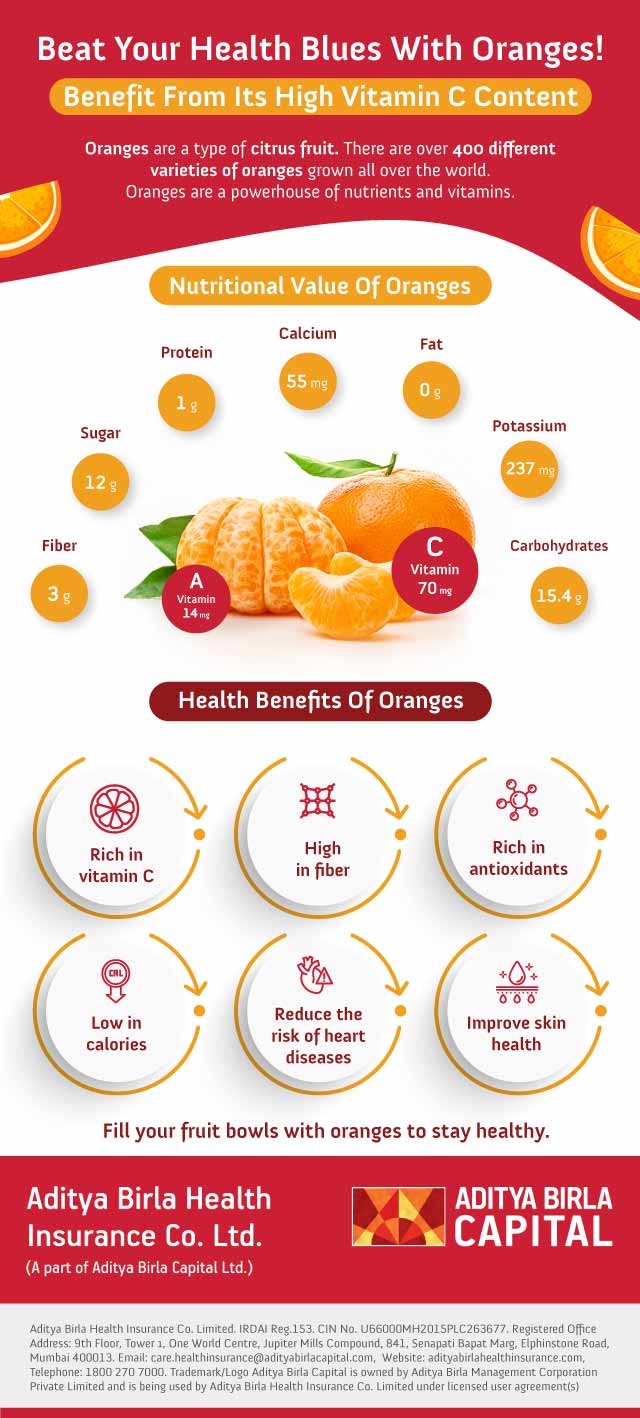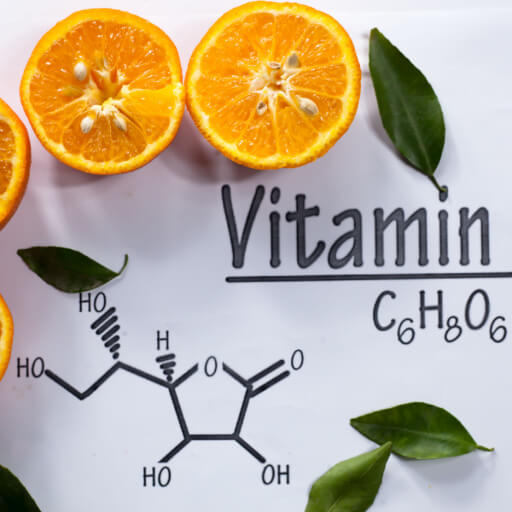
Oranges are a low-calorie, nutritious fruit that can enhance your skin and reduce the risk of certain health conditions such as diabetes and high blood pressure. Several types of oranges are also rich in antioxidants.
इनके बारे में जानें:
- The vitamin C, also known as ascorbic acid, in oranges can perform other functions as well
- Beyond vitamin C: Unveiling the multifaceted health magic of oranges
- Oranges are a treasure trove of essential nutrients
- Take a look at what makes ‘ap-peeling’ benefits of an orange peel
- Citrus showdown: Comparing oranges to other vitamin C powerhouses
The vitamin C, also known as ascorbic acid, in oranges can perform other functions as well
Here are some common functions of vitamin C in oranges:
- Vitamin C is a powerful antioxidant that protects cells from damage and protects your skin.
- It stimulates the production of white blood cells, which protects and supports the इम्यून सिस्टम.
- Vitamin C can lower the risk of age-related cognitive decline and improve cognitive function.
- It lowers ब्लड प्रेशर and the stress-inducing cortisol hormone.
Beyond vitamin C: Unveiling the multifaceted health magic of oranges
Here are some health benefits of oranges:
- Anti-inflammatory properties: When you have some infection, your immune system gets attacked, and it causes inflammation that can trigger diabetes, दिल की बीमारी and even Alzheimer’s. Consuming oranges can reverse this situation because of their anti-inflammatory properties.
- Protection against chronic conditions: Consuming oranges daily can reduce the risk of certain types of cancer, including:
- Oral cancer
- Head and neck cancer
- Stomach cancer
- फ़ेफ़ड़ों का कैंसर
- Reduces the risk of anemia: Consuming vitamin-C-rich foods such as oranges can help prevent anemia, a medical condition in which your blood has a deficiency in iron. While oranges are low in iron content, they are rich in vitamin C. Vitamin C enhances iron absorption from plant-based foods by converting iron into a form that is easier for the body to absorb and, in turn, prevents anemia.
- Skin health: Consuming this fruit benefits in the synthesis of collagen. It is a structural protein for skin health, bones, and connective tissues. Collagen also helps the body to form new tissues and promotes wound healing.
- Keeps you hydrated: One orange provides about 121 grams or ½ cup of water. We get around 20% of our fluids from food items. Fruits like oranges can help you meet this requirement. Orange can also help:
- Prevent dehydration
- Maintain your body temperature
- Enable proper digestion
- Push out waste.
Oranges are a treasure trove of essential nutrients
Here are some nutritional benefits of oranges that you can reap daily:
- The fiber in oranges can keep blood sugar levels in check and reduce high cholesterol, making it a healthy fruit for people with diabetes. A whole orange is healthier than orange juice because of the presence of fiber in it. Juices are higher in sugar and lower in fiber, leading to weight gain. The fiber in oranges makes you feel fuller for a long time and less inclined to snack on unhealthy foods.
- Folate acid is a part of vitamin B, required to create DNA and divide cells. Insufficient folate in your diet can lead to blood disease or congenital disabilities. Orange is an ideal fruit for pregnant women since it contains folate.
- Orange benefits your bones by containing around 55 milligrams of calcium, which helps strengthen your bones.
- Oranges comprise natural sugar, which contains fewer calories and more nutritional benefits.
- Oranges are a natural source of citric acid. They help prevent the formation of calcium oxalate stones, also called kidney stones.
- Not only the fruit but its peel is also highly nutritious. Orange peel is replete with dietary fiber, vitamins A and B, copper, calcium, folate, and magnesium.
Take a look at what makes ‘ap-peeling’ benefits of an orange peel
Here are some orange benefits that you can get easily:
- The flavonoids in orange peels contain a protein called RLIP76 and another compound known as limonene, which can reduce the risk of chronic conditions like cancer.
- The peels are rich in pectin, a fiber that regulates blood sugar levels. Therefore, orange benefits diabetes treatment.
- Orange peels contain a flavonoid called hesperidin, which can lower blood pressure and control cholesterol levels.
- The anti-bacterial properties of oranges can protect your teeth as well.
- Scrubbing orange peels against the skin can help treat blackheads, acne, dead cells, and spots.
Citrus showdown: Comparing oranges to other vitamin C powerhouses
Citrus fruits are renowned for their nutritional content, containing macronutrients like dietary fibers, natural sugars, and micronutrients including vitamin C, folate, thiamine, niacin, vitamin B6, riboflavin, and pantothenic acid. Additionally, citrus fruits like oranges are rich in bioactive compounds, such as limonoids, flavonoids, and carotenoids, which are essential for overall health. Here is a nutritional breakdown of 100 grams of oranges, lemons and grapefruits:
| पोषण | Orange | नींबू | चकोतरा |
| उर्जा | 47 kilocalories | 29 kilocalories | 22-kilocalories |
| Carbohydrate | 11.75 grams | 9.32 grams | 10.66 grams |
| प्रोटीन | 0.94 grams | 1.1 grams | 0.77 grams |
| फैट | 0.12 grams | 0.3 grams | 0.14 grams |
| Dietary fiber | 2.4 grams | 2.8 grams | 1.6 grams |
| Folate | 30 milligrams | 11 milligrams | 13 milligrams |
| Niacin | 0.282 milligrams | 0.100 milligrams | 0.204 milligrams |
| विटामिन सी | 53.20 milligrams | 53 milligrams | 31.20 milligrams |
| विटामिन A | 225 International unit | 22 International unit | 1150 International unit |
| पोटेशियम | 181 milligrams | 138 milligrams | 135 milligrams |
| कैल्सियम | milligrams | 26 milligrams | 22 milligrams |
| मैग्नीशियम | 10 milligrams | 8 milligrams | 9 milligrams |
Despite the many health benefits of oranges, it is best to be mindful of the portion size and eat this vitamin-packed fruit in moderation
Here are some precautions that you can take to consume oranges safely:
- If you are on beta blockers, the high potassium content in oranges can lead to kidney damage.
- Oranges have a high acid concentration, which can irritate the stomach, especially if you have gastroesophageal reflux disease (GERD).
- If you are suffering from hemochromatosis, avoid eating too many oranges, as they can increase iron content and cause tissue damage. It is a condition in which iron-building protein accumulates in various tissues, leading to liver damage or diabetes mellitus.
Oranges are one of the most popular fruits in the world and also one of the tastiest. Consuming it daily can help you boost overall growth and body function.
Stay tuned to the Activ Living Community. Keep up to date with the latest health tips and trends through expert videos, podcasts, articles, and much more in nutrition, fitness, mindfulness, and lifestyle conditions like Asthma, Blood Pressure, Cholesterol, and Diabetes. Activ Living ke saath sahi sehat ki shuruaat ABHIkaro.
You may also be interested in the following blogs:
- How Does Insulin Therapy Make Life Easier?
- Sedentary Lifestyle And Diabetes: Transform Passive Life To Active Life
Popular Searches
How to lower blood pressure | Fruits good for liver | Unhealthy foods | रागी के लाभ | बेसल मेटाबोलिक रेट | हाई ब्लड प्रेशर के लिए एक्यूप्रेशर पॉइंट्स | Ayurvedic medicine for blood pressure | How to control cholesterol at home | Homeopathy for Asthma | Biological Age | Home remedies for TB | Natural beta blockers | Negative effects of internet | Types of walking | ब्लड प्रेशर कैलकुलेटर | ब्लड शुगर कैलकुलेटर | BMI कैलकुलेटर





 1800-270-7000
1800-270-7000







